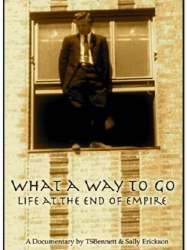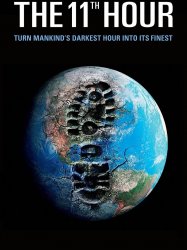Five Ways to Save the World is a British film of genre Documentary
Five Ways to Save the World (2006)

If you like this film, let us know!
- Infos
- Casting
- Technical infos
- Photos
- Videos
- Film quotes
- Characters
- Music
- Awards
OriginUnited-kingdom
Genres Documentary
Five Ways to Save the World is a British documentary film on environmental issues related to climate change, released in 2006. The film was made by Karen O'Connor, for the big screen and was shot in the English language to reach an international audience. It includes interviews with five environmental scientists and experts including Paul Crutzen, James Roger Angel, John Latham, Ian Jones, and Klaus Lackner.
The "five ways" proposed are geoengineering techniques:
space lenses in orbit, to diffract sunlight away from the earth
cloud seeding with seawater to increase albedo
sulfur launched into the stratosphere to increase albedo
ocean fertilization with iron or urea (nitrogen fertilizer)
artificial trees (see carbon capture and sequestration)
Since the first three methods do not remove carbon dioxide from the atmosphere, they would only reduce global warming but not ocean acidification. Since the last two methods would remove carbon dioxide, they could in theory reduce both global warming and ocean acidification.
Comments
Leave comment :
Suggestions of similar film to Five Ways to Save the World
There are 8957 with the same cinematographic genres, 2491 films with the same themes (including 43 films with the same 3 themes than Five Ways to Save the World), to have finally 70 suggestions of similar films.If you liked Five Ways to Save the World, you will probably like those similar films :

Dams: The Lethal Water Bombs (2011)
, 21minutesDirected by Sohan Roy
Genres Documentary
Themes Environmental films, Documentary films about environmental issues, Documentary films about historical events, Documentary films about technology, Disaster films
Rating72%





The Banqiao Dam in China, with its 492 million cubic meters of water, has a similar capacity to the Mullaperiyar Dam, with 443 million cubic meters. When it was destroyed by torrential rains in 1975, it claimed the lives of 250,000 people. This documentary is based on the possibility of a similar disaster happening to the Mullaperiyar Dam in India.
 , 2h3
, 2h3Origin USA
Genres Documentary
Themes Environmental films, Documentary films about environmental issues, Documentary films about politics, Documentary films about technology, Political films, Disaster films
Actors Daniel Quinn
Rating75%






Black Wind, White Land (1993)
, 53minutesGenres Documentary
Themes Environmental films, Documentary films about environmental issues, Documentary films about historical events, Documentary films about nuclear technology, Documentary films about technology, Disaster films

Everything's Cool (2007)
Genres Documentary
Themes Environmental films, Documentary films about environmental issues, Disaster films
Actors Leonardo DiCaprio, Bill Maher, Oprah Winfrey
Rating67%






The Unnamed Zone (2006)
, 1h20Directed by Carlos Rodríguez
Genres Documentary
Themes Environmental films, Documentary films about environmental issues, Documentary films about historical events, Documentary films about nuclear technology, Documentary films about technology, Disaster films
Rating63%





The Spanish film crew led by Carlos Rodriguez is following the life stories of three children - Lidia Pidvalna, Anastasia Pavlenko, and Andriy Kovalchuk - whose lives were drastically changed after an explosion at the Chernobyl Nuclear Power Station on April 26, 1986. Through the documentary, the children and their families "living perilously close to the exclusion zone around the destroyed station recount their fears, dreams, fantasies, and hopes for the future." Each child holds a "Chernobyl certificate" which bestows access to government grants and aid and is a gruesome reminder of their existential reality.

Chernobyl.3828 (2011)
, 30minutesOrigin Ukraine
Genres Documentary, Historical
Themes Environmental films, Documentary films about environmental issues, Documentary films about historical events, Documentary films about nuclear technology, Documentary films about technology, Disaster films
Rating74%





Twenty-five years have passed since Valeriy Starodumov worked as a dosimeter scout in September 1986. Valeriy worked at the epicenter of the explosion, the reactor's operation area, which was the most radioactive part of the site. The protagonist, a direct participant in the operation, went to the roof himself and brought people there after a failed attempt to clear the area with robots. At the government level, it was decided to assign soldiers and cadets of military schools to the task of cleaning the roofs. Unique pictures of the events of 1986 are widely used in the film. "Chernobyl.3828" is dedicated to people who saved the world from the radioactive contamination at the cost of their health and life.

The Yes Men Are Revolting (2014)
, 1h31Genres Documentary
Themes Environmental films, Documentary films about environmental issues, Disaster films
Rating66%





The Yes Men are a culture jamming group that use satirical performance art to make political points. While impersonating public relations personnel, they hold fake press conferences where they announce corporations, governments, and other organizations have taken a new, leftist stance. After seeing little gain from their pranks and increasing demands in their personal lives, The Yes Men debate whether they should continue. They are reinvigorated by the Occupy Wall Street protests and embark on a new campaign to combat climate change denial.

This Changes Everything (2015)
, 1h29Genres Documentary
Themes Environmental films, Documentary films about environmental issues, Disaster films
Actors Naomi Klein
Rating63%






The 11th Hour (2007)
, 1h32Origin USA
Genres Drama, Documentary, Crime
Themes Environmental films, Documentary films about environmental issues, Disaster films
Actors Leonardo DiCaprio
Rating71%





With contributions from over 50 politicians, scientists, and environmental activists, including former Soviet leader Mikhail Gorbachev, physicist Stephen Hawking, Nobel Prize winner Wangari Maathai, and journalist Armand Betscher, Paul Hawken, the film documents the grave problems facing the planet's life systems. Global warming, deforestation, mass species extinction, and depletion of the oceans' habitats are all addressed. The film's premise is that the future of humanity is in jeopardy.

Origin USA
Genres Documentary
Themes Environmental films, Documentary films about environmental issues, Disaster films
 Connection
Connection